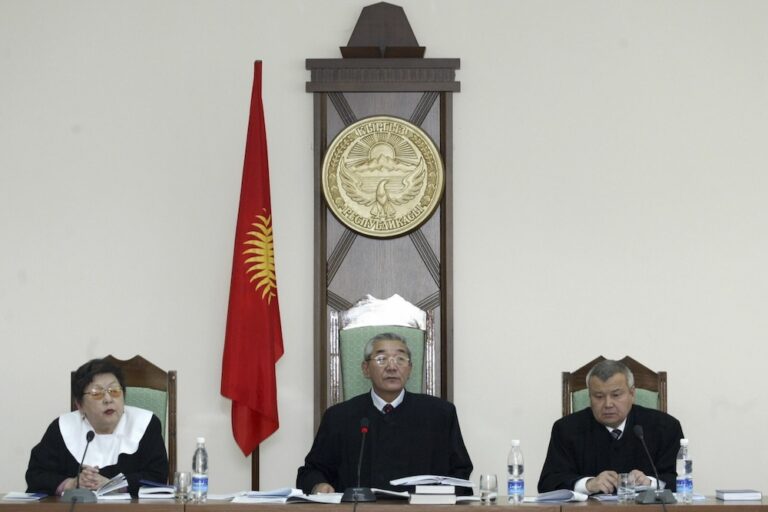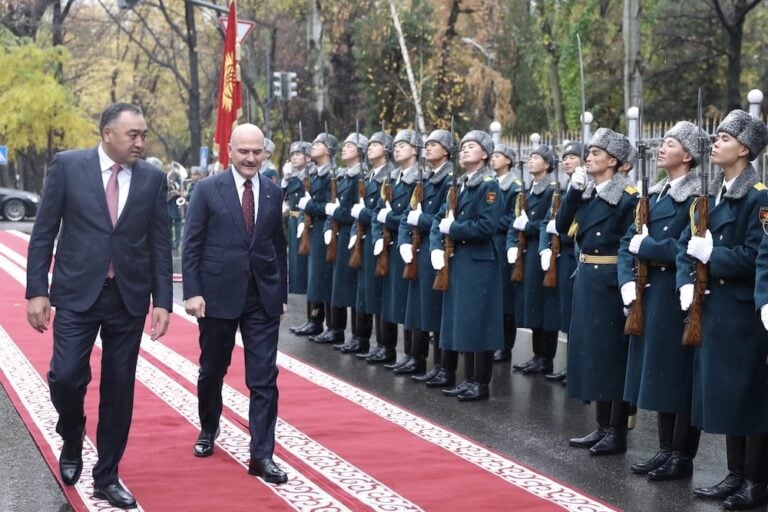A CPJ delegation met with Muktar Djumaliyev yesterday to discuss the findings of a new report that documents the flawed judicial process that led to journalist Azimjon Askarov's 2010 conviction.
(CPJ/IFEX) – Washington, D.C., June 13, 2012–The Kyrgyz ambassador to the United States has agreed to present CPJ’s findings on Azimjon Askarov, a journalist unjustly sentenced to a life term, to the president of Kyrgyzstan after a CPJ delegation met with him today to review the case.
The delegation, which included CPJ board members and prominent journalists Andrew Alexander and Clarence Page, and Muzaffar Suleymanov, the research associate for CPJ’s Europe and Central Asia program, presented ambassador Muktar Djumaliyev with CPJ’s new report on Askarov as well as an open letter addressed to President Almazbek Atambayev. The report and letter document Askarov’s 2010 conviction following a judicial process marred by fabricated charges, lack of evidence, procedural violations, and torture in custody.
Djumaliyev told the delegation that he would pass CPJ’s report and letter to Atambayev and other members of the government, including the minister of justice. He also said he would present CPJ’s findings to the Kyrgyz parliament and invited CPJ to speak on Askarov’s case before parliament members. “Kyrgyzstan recognizes the sensitivity of the issue,” Djumaliyev told CPJ. “The government should be looking to solve this problem in a transparent way.”
CPJ board member Alexander said, “We found the ambassador very much interested in finding a solution.” Page, also a CPJ board member, added, “The meeting went in a positive direction, and the ambassador engaged CPJ’s help in resolving the case.”
Authorities in Bazar-Korgon, a village in southern Kyrgyzstan, imprisoned Askarov on June 15, 2010, amid bloody ethnic clashes that swept through the region and left hundreds dead and hundreds of thousands displaced. Three months later, a court convicted him on politicized charges, ordered his property confiscated, and sentenced him to life in prison.
An investigative journalist and the head of the now-defunct human rights group Vozdukh (Air), Askarov documented the ethnic conflict and shared his findings with local and international journalists and human rights groups, he told CPJ. During his career, he also exposed official corruption by regional police, investigators, and prosecutors who fabricated criminal cases and tortured, raped, and killed detainees of the conflict. Askarov’s reporting led to the termination of official jobs and other disciplinary actions against local officials and law enforcement agents, local sources told CPJ.
“I am pleased that the Kyrgyz government showed their willingness to resolve the case by accepting the CPJ delegation,” said Muzaffar Suleymanov, research associate for CPJ’s Europe and Central Asia Program. “We are looking for the Kyrgyz authorities to make their first steps toward justice by reviewing CPJ’s findings and releasing Askarov from jail without delay.”


